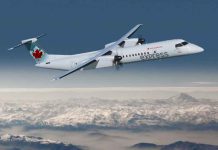Boeing is continuing work on software upgrades for their 737 MAX aircraft. The company says that those upgrades are taking longer than expected. This is impacting commercial aviation as there is a worldwide grounding of the aircraft.
Boeing states, “The Maneuvering Characteristics Augmentation System (MCAS) flight control law was designed and certified for the 737 MAX to enhance the pitch stability of the airplane – so that it feels and flies like other 737s.
MCAS is designed to activate in manual flight, with the airplane’s flaps up, at an elevated Angle of Attack (AOA).
Boeing has developed an MCAS software update to provide additional layers of protection if the AOA sensors provide erroneous data. The software was put through hundreds of hours of analysis, laboratory testing, verification in a simulator and two test flights, including an in-flight certification test with Federal Aviation Administration (FAA) representatives on board as observers.
The additional layers of protection include:
- Flight control system will now compare inputs from both AOA sensors. If the sensors disagree by 5.5 degrees or more with the flaps retracted, MCAS will not activate. An indicator on the flight deck display will alert the pilots.
- If MCAS is activated in non-normal conditions, it will only provide one input for each elevated AOA event. There are no known or envisioned failure conditions where MCAS will provide multiple inputs.
- MCAS can never command more stabilizer input than can be counteracted by the flight crew pulling back on the column. The pilots will continue to always have the ability to override MCAS and manually control the airplane.
“These updates reduce the crew’s workload in non-normal flight situations and prevent erroneous data from causing MCAS activation.”
Air Canada said today that due to Transport Canada’s continued closure of Canadian airspace to the Boeing 737 MAX aircraft, it has further adjusted its schedule through to May 31. The carrier anticipates it will cover 98 per cent of previously planned flying for the month through a series of mitigation measures, schedule changes and temporary route suspensions.
“Air Canada assures its customers that we are doing everything possible to mitigate the effects of the 737 MAX grounding, and we appreciate our customers’ patience and flexibility as we continue to work on transporting them safely to their destinations. By adjusting our schedule for the month of May, we are providing certainty for our customers so they can continue to book and travel with confidence on Air Canada,” said Lucie Guillemette, Executive Vice President and Chief Commercial Officer at Air Canada.
In compliance with the safety notice issued by Transport Canada on March 13, 2019, Air Canada grounded its fleet of 24 Boeing 737 MAX aircraft. Boeing has advised that deliveries of its 737 MAX are currently suspended. Air Canada was expecting six new aircraft in March and April.
Air Canada is now updating its June schedule to optimize its fleet and re-accommodate customers. Because the timeline for the return to service of the 737 MAX is unknown, for planning purposes and to provide customers certainty for booking and travel, Air Canada has removed 737 MAX flying from its schedule until at least July 1, 2019. Final decisions on returning the 737 MAX to service will be based on Air Canada’s safety assessment following the lifting of government safety notices and approval by international regulatory authorities.
Among the measures taken by Air Canada:
Mitigations
To mitigate the impact, Air Canada has been substituting different aircraft on 737 MAX routes. This includes flying routes with similar-sized or larger aircraft. To help provide this replacement flying, the carrier has extended leases for aircraft which were scheduled to exit the fleet. Air Canada is also accelerating the in-take of recently acquired Airbus A321 aircraft from WOW Air into its fleet.
Working with our Partner Airlines
The carrier has worked with other carriers to provide immediate extra capacity and provide alternative options to passengers. For example, its Montreal–Frankfurt flight for the month of May will be operated by Star Alliance partner Lufthansa.
Schedule Changes until June 30
The airline has implemented a number of route changes to date, either changing operating times or substituting larger aircraft with fewer frequencies on routes operated more frequently by smaller aircraft. For example, beginning in May two daily flights between Toronto and Calgary have been consolidated onto one larger Airbus A330, leaving nine daily flights.
In some cases, seasonal route launches have been delayed. This includes: Toronto–Portland, which will now start July 1instead of May 24; Vancouver–Boston, which will now start June 16 instead of June 1; and Calgary–Halifax, which will now start July 1 instead of May 18. The seasonal start of the carrier’s Toronto–Shannon route and new Montreal–Bordeauxservice will both be delayed until early July.
In addition, selected frequencies on domestic routes such as Toronto–Edmonton, will be served by Air Canada Rouge aircraft.
Route Suspensions
In a small number of cases, Air Canada has temporarily suspended service on certain 737 MAX routes where alternative aircraft are not presently available. This includes flights from Halifax and St. John’s to London Heathrow, for which it is re-accommodating customers over its Toronto and Montreal hubs. These routes are now suspended to May 31, but Air Canada remains committed to these routes.
Customer Information
As changes are finalized in the flight schedule, customers whose flight times or flight numbers have changed can expect to receive an email detailing their updated itinerary. This information is also available in My Bookings on the Air Canada app or Air Canada website. Customers are advised, whether they have booked directly through Air Canada or not, to ensure their contact information is on their booking to facilitate communication of any flight changes.
Air Canada has put in place a flexible rebooking policy with full fee waiver and a refund option for affected customers. Customers originally scheduled to travel on a 737 MAX can call Air Canada at 1-833-354-5963 for information within 72 hours of their planned flight. Customers who have booked flights through a Travel Agent should contact them for immediate assistance.
Customers are further advised to check the status of their flight using the Flight Status function on the Air Canada app or on aircanada.com prior to going to the airport. Additional information, including specific changes to the April and May 737 MAX operation is provided at the special page, Update on flights operated by the Boeing 737 MAX, available on www.aircanada.com that will be updated as warranted.






